How a boy and deserter helped blow up German WW2 HQ
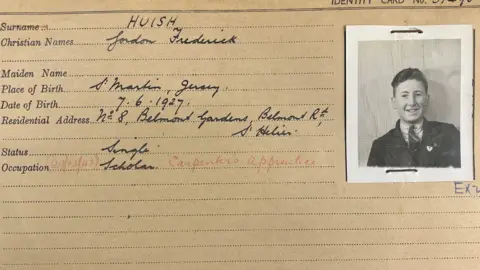 Jersey Heritage
Jersey HeritageThe date 7 March 1945 was another dreary day in the German Occupation of Jersey.
Islanders and Germans alike went about their business, all suffering from the deprivations inevitable after five years of war.
Then suddenly, from the direction of Mont Millais, a series of loud explosions shattered the peace, and so began a mystery that was to endure for decades.
The Palace Hotel was a large, grand building at the top of the hill near the current Jersey College for Girls.
Before the war it had offered "self contained suites, unsurpassed dining, a nine hole golf course and two full size tennis courts", among other luxuries.
When the Germans arrived, they requisitioned it as an ideal headquarters.
For the years of Occupation it bustled with high ranking officers coming and going in their staff cars, planning their operations and enjoying the facilities.
It is thought they planned the successful raid on Granville in March 1945 there.
However, members of a small resistance cell were planning a spectacular end to the palace.
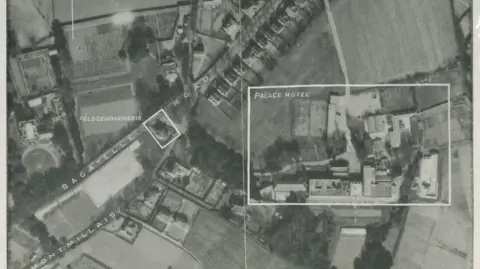 Jersey Heritage
Jersey HeritageThere had been little in the way of armed resistance during the Occupation of Jersey.
Unlike France and other countries, it was far harder for islanders to obtain weapons, plan attacks and, most importantly, get away again.
"One should remember that any kind of real resistance was simply impossible in an island where one in five people was a German and there was no chance of any arms drops or support from the mainland," recalled historian Bob Le Sueur MBE.
"Even if there had been, any kind of collective action, armed or otherwise, would have been utterly futile in an island where there was nowhere to hide, prepare or train."
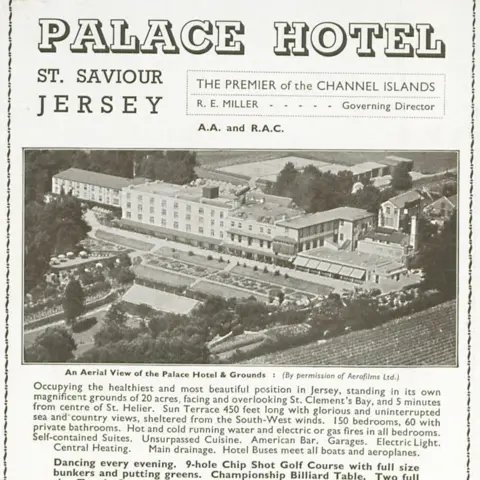 Jersey Heritage
Jersey HeritageThere was one small group which hoped to make a difference.
They were a collection of communists led by Norman Le Brocq, who later went on to become a States member.
Evidence which only recently came to light indicates they were responsible for the spectacular destruction of the glamorous Palace Hotel.
On the morning of 7 March, a fire in the building very quickly led to several large explosions.
As the Germans frantically tried to limit the damage and prevent flames from spreading, they added to the destruction by blowing fire breaks between the different parts of the hotel.
Nearby residents reported their windows blowing out, and seeing hundreds enemy soldiers running around trying to get the fires under control, but they had little chance.
By the time the fire was out, the hotel was destroyed, together with whatever equipment, maps and records the Germans had left inside.
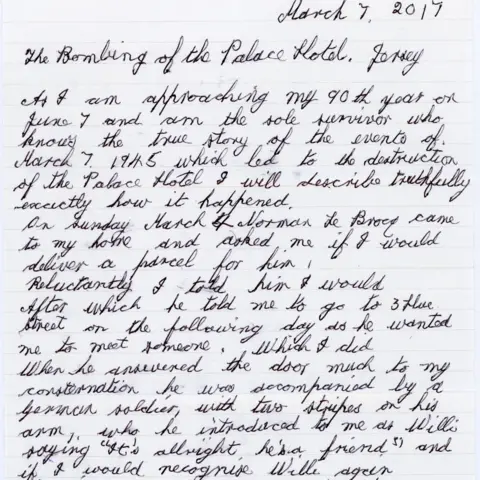 Jersey Heritage
Jersey HeritageWhat had caused this catastrophic destruction? It was the question on everybody's lips.
There were all sorts of ideas about what had happened.
Some suggested a wayward RAF bomber had dropped its payload over St Saviour and scored a direct hit on the Palace Hotel.
Others said it was an accident from Germans training with explosives nearby, while others still said it could have been an act of resistance.
For years there was no clear answer, although there was a degree of suspicion towards Norman Le Brocq's communist organisation.
There was no definitive answer, until recently, when Jersey Archive received a letter from a man in Australia claiming he had been closely involved.
The letter was written by a man called Gordon Huish, who would been 17 at the time of the explosion.
After the war he and his family had emigrated to Australia - where he lived until his death.
In 2017 he wrote an account of what happened, with the title The Bombing of the Palace Hotel.
His family promised not to share it while he was still alive.
Last year they sent it to the archive, where researchers realised with delight it was likely to solve the mystery.
Very dangerous job
It began: "As I am approaching my 90th year on June 7th and am the sole survivor who knows the true story of the events of March 7th 1945 which led to the destruction of the Palace Hotel I will describe truthfully how it happened."
Born in 1927, Gordon Frederick Huish grew up in St Helier.
His registration card showed he was living at No 8 Belmont Gardens, on Belmont Road.
At some point during the Occupation he became involved with Norman Le Brocq's group of resisters and it seemed they recognised him as the perfect candidate for a very dangerous job.
The letter goes on to explain he was introduced to a German soldier called Willi, and told that he was a "friend".
Some days later, Huish was asked to go to a garage on Halkett Place to collect something to deliver to Willi.
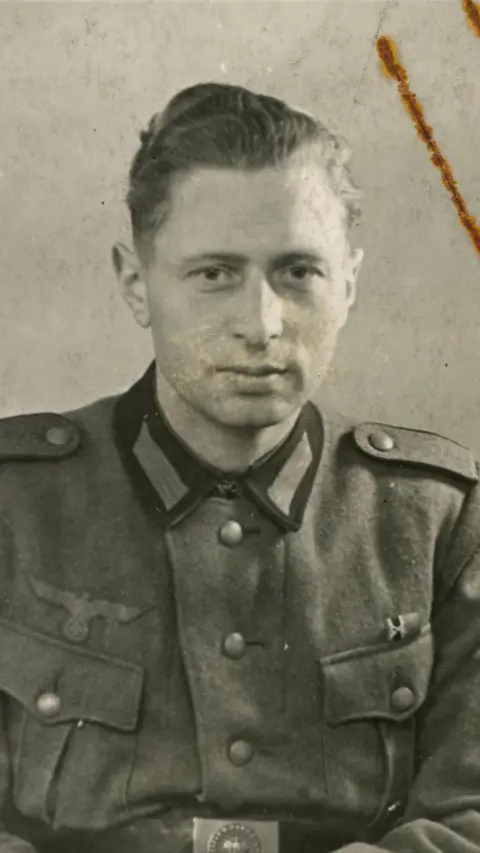 Jersey Heritage
Jersey HeritageHe was told to wear gloves if he had them, according to the letter.
Upon reporting to the garage, he was handed a heavy parcel wrapped in brown paper and string through a small hatch, so he could not see who was passing it to him.
As instructed, Huish took the parcel, which felt like a car battery with wires coming from it, up to Mont Millais there to meet the friendly German.
Willi was in fact a disillusioned German soldier named Paul Muhlbach who had somehow become acquainted with Le Brocq and his comrades.
He fell out with the Nazi regime after his father was arrested and sent to the concentration camp at Dachau.
Paul himself was also imprisoned for a short time before being forced to join the army.
Before deserting in Jersey, he helped Le Brocq's group produce anti-Nazi propaganda, which was circulated among other soldiers, inciting them to mutiny.
On the morning of 7 March 1945, in his uniform, he waited for Gordon Huish at the Palace Hotel.
His official job there was to inspect the explosives that were stored in the hotel's magazine - a perfect opportunity for someone intent on destruction.
Loud explosions
Muhlbach was waiting at the entrance to the hotel, and Huish handed him the parcel before making his way to Mont Millais.
He describes in the letter how soon after there was a "very loud explosion" followed by streams of German soldiers and ambulances racing down the road towards the scene.
Huish wasted no time in making himself scarce, and was never caught.
Muhlbach also got away with it, by deserting and getting shelter from the resistance group which used civilian clothes and hair dye to disguise his appearance.
Further explosions and a fire devastated the whole site of the hotel.
The Germans were furious, but baffled, and did not manage to work out what had happened.
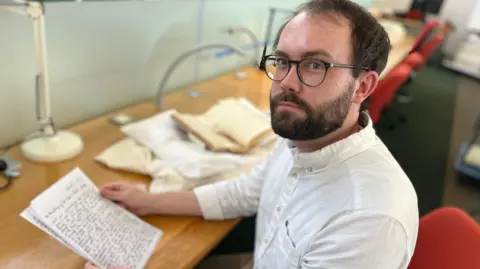
Until the appearance of Gordon Huish's letter, the mystery remained.
Researchers at Jersey Heritage were surprised and delighted to receive the letter, and solve a long-lasting mystery.
Digital access manager Harry Le Feuvre said it was important evidence of one of the most dramatic moments of the Occupation of Jersey.
"The letter is so detailed, and so specific on certain details, that it really does feel like the story has finally been told and that that mystery has been finally resolved after 80 years," he said.
Today, the site of the once-grand hotel is a private housing estate.
It is named in recognition of its past, Palace Close.
Follow BBC Jersey on X and Facebook. Send your story ideas to [email protected].
